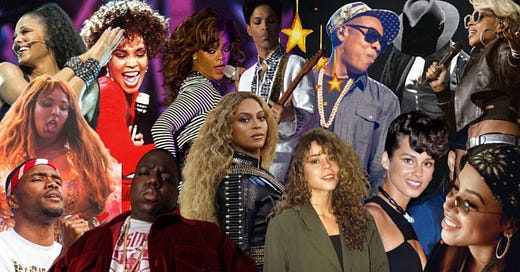-To read this piece and others in the print version of the zine. Order here.
Recently, viral videos have been popping up on social media of middle school-aged kids singing along to Keyshia Cole’s 2005 song “Love”. Perplexing…because for these kids, the heart-wrenchingly vulnerable song is quite sunny and G-rated contrasted with many R&B artists’ music today, whose lyrics speak to their hazier, defeatist outlook toward love. SZA and Summer Walker boldly declare in “No Love” that “all I wanna do is fuck...get drunk…hop planes…all lust….there would be no loving you…fuck love.” A far cry from the old days, when Jill Scott coos about a man’s attention and self-sacrifice in “He Loves Me,” subtly inciting her arousal.
To be fair, Summer Walker is expressing her frustration with a man after she had put everything into the relationship and with whom, she concedes, she was in love. But the blunt and rather nihilistic reaction of “fuck love” seems to have become more prominent in today’s R&B music.
So where did the shift happen?
In the 90s, the neo-soul movement found both male and female artists grappling with the complexities of love in their music. Maxwell, Lauryn Hill, D’Angelo, Erykah Badu, Jill Scott, and Anthony Hamilton definitely understood the hardship love brings along with it. But these were checkpoints to reflect on, look into it, or even to cry out to God for a transcendent understanding and solution– rooted in humility and the determination to “make it work.” And if it didn’t, this rarely turned into a call for a harsh referendum on their ex.
In 1999, Ms. Lauryn Hill took to the stage in Tokyo, side stepping in her heels, pouring her heart out in “Ex-Factor,” accompanied by an entire backing band with singers draped in their own fashions as she cried out “I keep letting you back in/how can I explain myself/as painful as this thing has been/I just can’t be with no one else.” The universality of Ms. Hill’s dilemma enveloped her Japanese audience–perhaps not all of them understanding the English language, but being all too familiar with the languages of love and heartbreak. And in Mary J. Blige’s “Not Gon’ Cry” from the Waiting to Exhale soundtrack, after she had been disrespected, and left with pain by a husband she committed to, she whines in the bridge “I know there are no guarantees/in love, you take your chances….”.
Even the more commercially-driven songs of artists in the early to mid aughts like Chris Brown, Ashanti, Usher, and Ne-Yo featured soulful, heartfelt lyrics, production, and vocals.
It seems that R&B music shifted somewhere along the cultural faultline where Americans started to claim to be more self-aware, conscious of “protecting their peace” and blocking out “toxic” relationships–thanks in part to the mass expansion of Western talk-therapy–our secular form of salvation. And yet, despite priding ourselves for our growth in “emotional intelligence,” we seem to be more apathetic and detached, averse to risk, vulnerability, and humility. We are fine with pleasure and empathy, but avoid passion and compassion. We are more interested in posturing ironically for the gram and parading our bad-bitchery than actually seeking, than feeling that flame which might possibly set our hearts ablaze or burn us. Better to stay cool, calm, and collected.
Put bluntly, we have sold our souls.
Our current soulless state is reflected not only in the lyrics but also in the production. Composers and producers now substitute live in-studio instruments–which require their players to have skill, passion, and dare I say, love–for speedy button-and-knob production. Vocals are often laid down apart from the production, and in the case of duets, apart from featured artists, only to be copy and pasted onto production software later on.
The trajectory of the self-proclaimed “flawless” Queen Beyonce’s career epitomizes R&B’s vibe shift. From her impassioned ballads and up-tempo jams in her earlier days—many of which sampled old soul hits from the 70s and 80s—where she belted about the “dangers” of being in love and the amazement of finding a lover who values her “flaws and all,” to the braggadocious dominatrix singing about riding her lover’s “surfbort” and demanding that her inferiors (“bitches”) bow down to her–over electronically produced beats, Yonce has set the tone for other R&B singers aspiring to approach (but of course, to never reach) her status.
Ironically, it was the poor, unfortunate soul Keyshia Cole who dared to challenge Beyonce’s presumptuous demand, stating “First ‘women need to stick together’ now bitches better bow. Smh. But it’s all G! Chicks stay shooting the shit. But when I speak my mind it’s a prob.” Dare we ask whether the all-powerful goddess of the industry had a hand in suppressing Keyshia’s more recent tracks from making it onto the charts… “Bow Down” was the first Beyonce song to employ a curse word. After its release and the success of the entire Sasha Fierce girl-boss attitude, I started to notice other formerly clean-edited R&B singers using curse words. The curse words seemed to morph into overtly sexual lyrics, rivaling rap stars’ history of sexual expression.
Not to sound like a conservative prude, but it’s in the subtle innuendo where things that can’t be said explicitly that sexual desire is conveyed most creatively…and seductively. Many artists–be they filmmakers, singers, or writers–of the not-too-distant past, knew this, obscuring a direct expression of sexuality but trusting the audience would feel the tenuous, illustrious reality of what is being portrayed in the art. Tennessee Williams’ covert homosexual requite comes to mind.
Next’s infamous song “Too Close” is a good example of an an R&B song that used double entendre as an entire motif. It is sort of a silly mental experiment to imagine how that song would be restructured today. But I’d be down to hear it.
Of course, not all R&B was a clean-cut edit. I remember my obsession with Akinyele’s hot single “Put It in My Mouth” featuring Kia Jeffries’s vocals which cemented the song’s catchiness and success—singing along as pubescent youths about acts we had perhaps barely contemplated yet.
Granted, music has often been a means to grapple with the internal forces that wreak havoc on the soul–and quite possibly to save it from said forces. Violent rap lyrics have always been a point of contention for those who don’t see music’s ability to quell the propensity to commit violent acts. Listening to raunchy sexual music might simply be a way to relieve one’s itchy horniness or even perverse desires, and thus abstain from indulging in the act itself. But it might also incite other listeners to actually act on those desires or actions being sung about–both violent and sexual ones. Again, the metric for such an evaluation seems elusive. But one thing seems certain: the inundation of overt sexual lyrics combined with the overproduced ambient low-beat man-hating jams may be reaching its peak. I dig the vibe, but there’s a point when you reach fatigue.
Thus the irony of the slew of recent hip hop singles sampling late 90s/early 2000s R&B songs where love wasn’t the archfoe or a mere transactional exchange of pleasure, but rather the goal itself. Burna Boy sampled Brandy and Toni Braxton. Drake’s used Lauryn Hill and Mariah Carey tracks. Nicki Minaj looped the hook from Lumidee’s (one) hit and Latto featured the chorus from Mariah’s “Fantasy” on “Big Dick Energy” (catch the rhyme?”). These juxtapositions of fuck-love, or love-as-fucking, with love-love speak to our conflicted cultural moment, which possibly recognizes the emptiness of its blasé attitude toward love but can’t muster up the courage–the passion and desire–to face the drama of love and all that it entails head on.
Music is felt. A universal language that transgresses all man-made boundaries. It may be pointless to deconstruct patterns in popular music, but as a fierce conduit for connection in the social landscape, I believe that said patterns speak—or rather, sing—volumes about our current status as a society. And if that is true, the recent obsession with Keyshia Cole’s “Love”—as well as the recent hip hop tracks sampling old R&B songs, be they as they may filled with cognitive dissonance—is a promising look into what the zoomers are craving: Not just revenge in response to pain associated with love, but healing, transcendence, and soul.
Brennan is a writer and artist living in New York City. @brennanvickery





